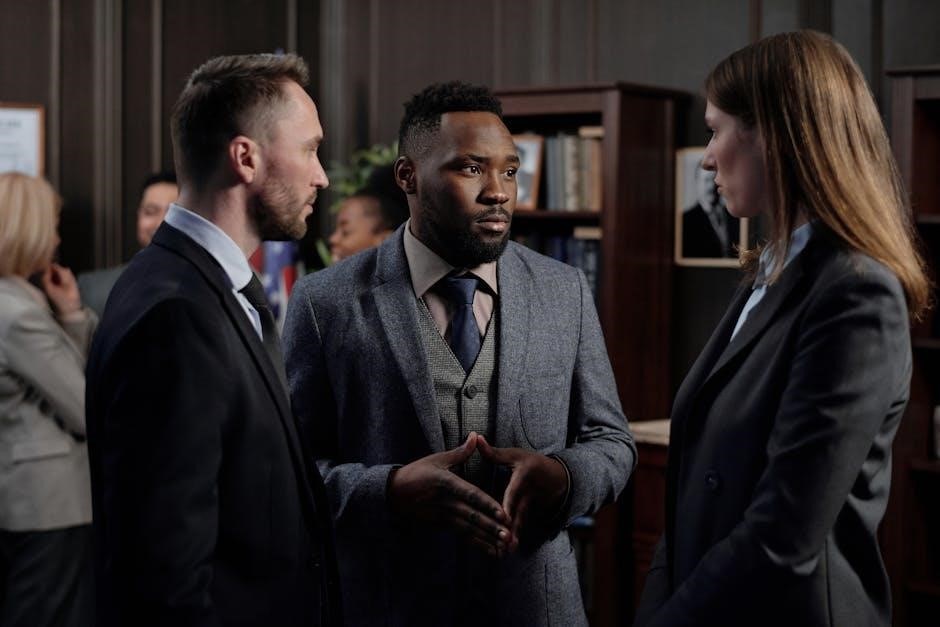Overview of “Counseling the Culturally Diverse: Theory and Practice” 9th Edition
Counseling the Culturally Diverse: Theory and Practice 9th Edition offers a comprehensive exploration of multicultural counseling, emphasizing cultural humility, social justice, and minority stress. Authored by Derald Wing Sue and colleagues, it remains a standard in the field, offering updated insights and strategies for culturally competent practice.
Key Concepts and Objectives of the Book
Counseling the Culturally Diverse: Theory and Practice 9th Edition focuses on fostering cultural competence, addressing systemic inequities, and promoting inclusive counseling practices. Key concepts include cultural humility, microaggressions, and the role of White allies in multicultural counseling. The book aims to equip counselors with practical strategies to navigate cultural differences, advocate for social justice, and support marginalized communities. By integrating theory with real-world applications, it emphasizes the importance of understanding diverse cultural values, beliefs, and experiences to create equitable counseling environments. Its objectives are to enhance multicultural awareness, reduce bias, and empower counselors to address the unique needs of diverse populations effectively.
The Role of Cultural Humility in Multicultural Counseling
Cultural humility is a cornerstone of effective multicultural counseling, emphasizing self-awareness, openness, and a commitment to understanding clients’ diverse cultural experiences without imposing one’s own biases or assumptions.
Understanding and Applying Cultural Humility in Practice
Cultural humility involves recognizing the limitations of one’s own cultural perspective and actively seeking to understand the client’s worldview. In practice, counselors must engage in self-reflection, acknowledge power dynamics, and prioritize the client’s voice. This approach fosters trust and collaboration, allowing counselors to navigate cultural differences effectively. By embracing cultural humility, practitioners can address systemic inequities and provide empathetic, client-centered care. Continuous learning and openness to feedback are essential for integrating cultural humility into daily counseling work, ensuring culturally responsive and ethical practice.

The Role of White Allies in Multicultural Counseling
White allies play a crucial role in supporting marginalized communities by advocating for equity and challenging systemic biases. They collaborate with diverse groups to foster inclusive environments.
Building Bridges Across Cultural Divides
Building bridges across cultural divides involves fostering mutual understanding and collaboration between diverse groups. The 9th edition emphasizes the importance of cultural humility and active listening to connect with clients from varied backgrounds. Counselors are encouraged to recognize and challenge their own biases, creating a safe space for dialogue. By fostering empathy and respect, professionals can help bridge gaps, promoting equity and inclusivity in counseling relationships. This approach not only enhances therapeutic outcomes but also strengthens community ties, ensuring marginalized voices are heard and valued.

Social Justice Counseling: A Core Component of the 9th Edition
Social justice counseling is a core focus, addressing systemic inequalities and advocating for marginalized communities. It empowers counselors to promote equity and justice in diverse settings.
Advocating for Equity and Inclusivity in Counseling
The 9th edition emphasizes social justice counseling as a critical approach to addressing systemic inequalities. It provides strategies for counselors to advocate for equity and inclusivity, ensuring marginalized communities receive fair treatment. By challenging oppressive systems and promoting cultural competence, counselors can create safe spaces for diverse clients. The book highlights the importance of empowering clients and collaborating with communities to address disparities. This approach fosters a commitment to justice and equality, equipping counselors to navigate complex social issues effectively. The focus is on actionable steps to dismantle barriers and promote inclusivity in all counseling settings.
Addressing Minority Stress in Diverse Populations

The 9th edition explores minority stress as a unique challenge faced by marginalized populations, highlighting its impact on mental health and well-being. It provides evidence-based strategies to address these stressors effectively.
Strategies for Counselors to Support Marginalized Communities
The 9th edition outlines practical strategies for counselors to support marginalized communities, emphasizing cultural humility, advocacy, and empowerment. It encourages counselors to address systemic inequities and promote social justice. By fostering trust and understanding, counselors can create safe spaces for clients to express their experiences. The book also highlights the importance of intersectionality, recognizing how multiple identities intersect to impact mental health. Evidence-based interventions and community-based approaches are recommended to enhance resilience and well-being in diverse populations. These strategies aim to equip counselors with the tools to advocate effectively and provide culturally responsive care.

Microaggressions and Their Impact on Counseling Relationships
Microaggressions, subtle expressions of bias, significantly impact counseling relationships by undermining trust and rapport. Recognizing and addressing these biases is crucial for fostering a safe and inclusive therapeutic environment.
Recognizing and Addressing Subtle Forms of Bias
Recognizing microaggressions is essential for counselors to build trust with diverse clients. These subtle, often unintentional biases can cause significant harm, reinforcing marginalization and hindering therapeutic progress. Counselors must engage in self-reflection and cultural humility to identify and address their own biases. The 9th edition emphasizes the importance of education and awareness in mitigating microaggressions, providing practical strategies to create a safe and inclusive counseling environment. By acknowledging and addressing these biases, counselors can foster deeper connections and promote equity in their practice.
Updates and Revisions in the 9th Edition
The 9th edition includes updated discussions on cultural humility, social justice, and allyship. New case studies and expanded insights on microaggressions enhance its relevance for modern counseling practice.
What’s New in the Latest Version of the Book
The 9th edition of Counseling the Culturally Diverse: Theory and Practice introduces updated discussions on cultural humility, social justice, and the role of White allies. It incorporates new case studies and expanded insights into microaggressions, minority stress, and intersectionality. The book also addresses emerging issues in multicultural counseling, such as the impact of digital communication on counseling relationships. These revisions ensure the text remains relevant and responsive to the evolving needs of diverse populations, offering practical strategies for counselors to enhance their cultural competence and advocacy skills in contemporary settings.

The Authors and Their Contributions to Multicultural Counseling
Derald Wing Sue, David Sue, Helen A. Neville, and Laura Smith are renowned experts in multicultural counseling. Their work emphasizes cultural humility, social justice, and addressing minority stress.

Derald Wing Sue, David Sue, Helen A. Neville, and Laura Smith

Derald Wing Sue, David Sue, Helen A. Neville, and Laura Smith are leading voices in multicultural counseling, renowned for their contributions to cultural competence. Their collaborative work in Counseling the Culturally Diverse: Theory and Practice has set a benchmark in the field. Derald Wing Sue, a pioneer in multicultural psychology, has extensively researched microaggressions and cultural humility. David Sue brings expertise in cross-cultural counseling and social justice advocacy. Helen A. Neville and Laura Smith contribute insights on intersectionality and marginalized communities. Together, they provide a comprehensive framework for counselors to address diversity and promote equity in practice.
The Significance of the Book in Counseling Education
Counseling the Culturally Diverse: Theory and Practice 9th Edition is a benchmark in counseling education, offering essential frameworks for addressing diversity and promoting equity in practice.
Why It Remains a Standard-Bearer in the Field
Counseling the Culturally Diverse: Theory and Practice 9th Edition is widely regarded as a seminal text in counseling education due to its comprehensive and nuanced exploration of multicultural counseling. It provides foundational theories and practical strategies for addressing cultural diversity, making it an indispensable resource for both educators and practitioners. The book’s emphasis on cultural humility, social justice, and evidence-based practices ensures its relevance in a rapidly evolving field. Its ability to bridge theory with real-world applications has solidified its position as a cornerstone in the education and training of counselors worldwide.

Practical Applications of the Book’s Theories
Counseling the Culturally Diverse: Theory and Practice 9th Edition provides actionable strategies for counselors, enabling them to support marginalized communities effectively. Its theories, supported by case studies and practical frameworks, are designed to enhance multicultural competence in real-world settings.
Implementing Multicultural Competence in Real-World Settings
Counseling the Culturally Diverse: Theory and Practice 9th Edition equips counselors with practical tools to implement multicultural competence in diverse clinical environments. Strategies include cultural assessments, awareness exercises, and case studies to address minority stress and microaggressions. The book emphasizes the importance of cultural humility and social justice advocacy, providing frameworks for creating inclusive therapeutic spaces. By integrating these approaches, counselors can better support marginalized communities, fostering equity and empowerment. Real-world applications are enhanced through evidence-based practices and reflective exercises, ensuring culturally responsive care in various settings.
